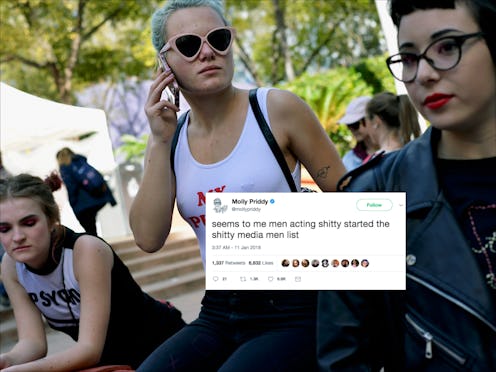News
The Most Disturbing Part Of The 'Sh*tty Media Men' List Is How It Was Turned AGAINST Women

In October of last year, following the cascade of allegations that had brought down the careers of a handful of predatory men, a journalist named Moira Donegan shared with friends a editable document named "Shitty Media Men." This was at the height of the #MeToo movement, when women — finally, excruciatingly — felt they'd gained back a modicum of power. "Shitty Media Men," developed to help women when corporations and legal systems would not, became a lightning rod for anti-feminist backlash. Even now, months later, "Shitty Media Men" is the reigning symbol of what right-wing commentators fear of "rogue feminism" — and, worse, the catalyst of what it sought to warn about in the first place: an attack on vulnerable women.
To unravel how a structure developed to protect women became a painful subject for them, let's start with what "Shitty Media Men" is about: sexual predators in media. It was not about justice — at least, not directly. It was not about victims. It was not, even, about women.
"Instead, the spreadsheet made a presumption that is still seen as radical," Donegan wrote for New York Wednesday night. "That it is men, not women, who are responsible for men's sexual misconduct."
The document was meant to warn female journalists about the predators in their industry. Some of the men named were later investigated and fired (a side effect of the power of the list, I'd argue, rather than its intent). Yet, the document didn't pretend to be "proof." A disclaimer kicked off the list of names: This document is only a collection of misconduct allegations and rumors. Take everything with a grain of salt.
In other words, the list knew it was flawed. Donegan knew. The women who read it, and added to it, and shared it, knew. Yet, it gave us a sense of security in a landscape where women who have been victims of sexual violence have had close to none.As Donegan points out in New York, options for victims are severely limited: HR departments protect the company. Criminal investigations into sexual misconduct are notoriously unsuccessful. All we've had is a "whisper network" — one that many women, particularly the young and inexperienced, aren't privy to.
Now, with "Shitty Media Men," we finally had an exhaustive and detailed database of 70-plus potential predators. It wasn't perfect, but it was a lifeline.
Fast-forward to this week, when the furor over "Shitty Media Men" — so reckless! thoughtless! damaging! unproven! — had apparently died down. An upcoming cover story at Harper's was rumored to focus on "Shitty Media Men." Donegan had received an email from a fact-checker, she writes, noting that the magazine planned to name her personally as a creator or co-creator of the list, and did she have a comment?
To understand the danger that now faced Donegan, you have to be familiar with another threat women describe in "whisper networks": doxxing. If you've heard about Gamergate — or if you've ever been a woman expressing an opinion on the internet — this might ring a bell.
Doxxing is a little like internet vigilantism, but darker. A person, often a woman, becomes a target, often by alt-right groups on sites like 4chan and 8chan. Her personal information — address, phone number, email address, social media accounts, you name it — is leaked out and shared widely. This often comes hand-in-hand with death and rape threats; in the case of Gamergate, women have fled their homes and feared for their lives.
Donegan has already lost her job. "My life changed dramatically," she wrote for New York. "The fear of being exposed, and of the harassment that will inevitably follow, has dominated my life since."
The entire saga is emblematic of the catch-22 that women face when trying to defend themselves against sexual harassment and abuse. Wearing a skirt? Well, what did you think would happen? Agreeing to a one-on-one meeting with a male supervisor? You should have declined. Reporting a sexual assault? How do we know it wasn't consensual? Realizing you've been taken advantage of? You shouldn't have had that last drink. Telling your friends about rumors you've heard? You could ruin his career. Exposing a predator to the other women in your network? What the hell were you thinking?
This isn't the first time that the women of #MeToo, in their efforts to support other women and adjust the culture, have had consequences crash down on them instead of — or as well as — the predators they're exposing. Meryl Streep was torn into for not knowing that Harvey Weinstein was a serial abuser. Tessa Thompson was condemned for clarifying who was, and wasn't, involved in #TimesUp. Rose McGowan has had to sell her house to fund a legal rebuttal against Weinstein.
Which brings me back to what "Shitty Media Men" is actually about: exposing sexual predators, with the goal of protecting women. This is what #MeToo was about. This is what #TimesUp is about. None of these movements have been perfect. Yet, these movements have been many women's most successful recourse in the face of rampant harassment, rape, and misogyny.
If women were believed when they spoke up, and if they were given the proper legal and societal protections before they had to do so, we wouldn't need to lean so fiercely on an imperfect database like "Shitty Media Men." Unfortunately, we are not.
Yes, the solution is flawed. The problem, however — the well-documented, well-established prevalence of sexual violence — is far, far worse. Stop focusing on one. Fix the other.
Editor's Note: This op-ed does not reflect the views of BDG Media and is part of a larger, feminist discourse on today's political climate.